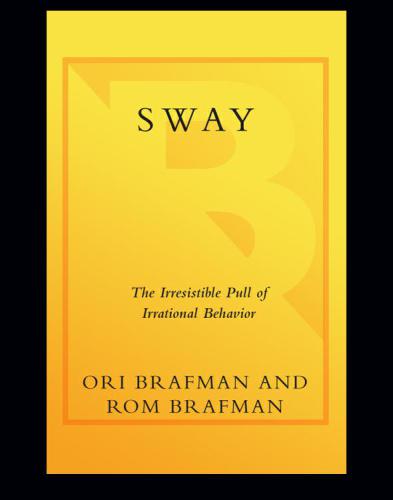
Sway
The Irresistible Pull of Irrational Behavior
- اطلاعات
- نقد و بررسی
- دیدگاه کاربران
نقد و بررسی

April 7, 2008
Recently we have seen plenty of irrational behavior, whether in politics or the world of finance. What makes people act irrationally? In a timely but thin collection of anecdotes and empirical research, the Brafman brothers—Ari (The Starfish and the Spire
), a business expert, and Rom, a psychologist—look at “sway,†the submerged mental drives that undermine rational action, from the desire to avoid loss to a failure to consider all the evidence or to perceive a person or situation beyond the initial impression and the reluctance to alter a plan that isn't working. To drive home their points, the authors use contemporary examples, such as the pivotal decisions of presidents Lyndon B. Johnson and George W. Bush, coach Steve Spurrier and his Gators football team, and a sudden apparent epidemic of bipolar disorder in children (which may be due more to flawed thinking by doctors making the diagnoses). The stories are revealing, but focused on a few common causes of irrational behavior, the book doesn't delve deeply into the psychological demons that can devastate a person's life and those around him.

May 1, 2008
In the first of these two books exploring human behavior and the choices we make, organizational expert Ori Brafman (coauthor, "The Starfish and the Spider: The Unstoppable Power of Leaderless Organizations") and his psychologist brother, Rom, an organizational expert, discuss the various psychological forces (e.g., diagnosis bias and loss aversion) that cause people to act irrationally. To help illuminate their discussion, they draw on the latest research in social psychology, behavioral economics, and organizational behavior. In "Nudge", Thaler (behavioral science & economics, Graduate Sch. of Business, Univ. of Chicago) and Sunstein (jurisprudence, Univ. of Chicago Law Sch.) consider how the science of choice can gently "nudge" individuals toward making life-improving decisions. They divide the text into five parts"Humans and Econs," "Money," "Health," "Freedom," and "Extensions and Objections"and employ numerous examples throughout. Easy to read, conversational in tone, and story-driven, "Sway" is suitable for public libraries. "Nudge", a more research-based analysis full of practical solutions to real-life problems, is strongly recommended for public libraries.Anita N. Jennings, Newport News P.L., VA
Copyright 2008 Library Journal, LLC Used with permission.

April 15, 2008
Here is a very intriguing look at how and why weordinary, intelligent peopleare sometimes compelled to act in extraordinarily foolish ways. How could a respected and accomplished pilot choose to ignore all of his training and wind up killing himself and everyone on board his plane? How could a student let himself get talked into buying a $20 bill for more than $200? Why did nearly 60 percentof a game-show audience say that the sun revolves around the Earth, when they surely knew better? It all comes down, the authors say, to ordinary human behavior: our tendency to try to minimize losses; to rethink our first impressions; to admit a course of action is wrong, once weve committed to it. The book relies heavily on actual case studies, as opposed to general theorizing: the authors point to a specific situation, analyze it, and explain it (often by referring to psychological experiments or material in the literature of psychology). This is one of those books that, by telling us about things other people have done, tells us even more about ourselves.(Reprinted with permission of Booklist, copyright 2008, American Library Association.)




دیدگاه کاربران